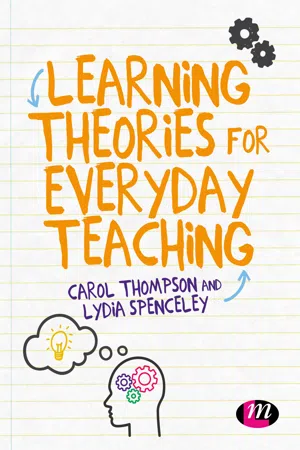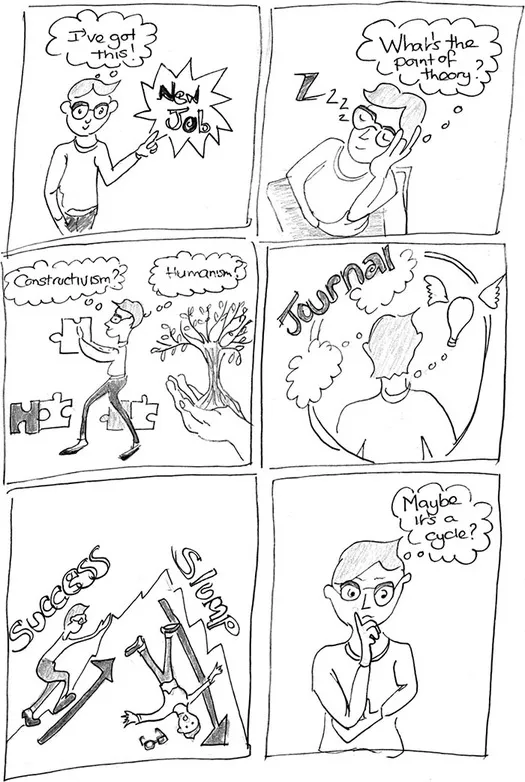
- 160 pages
- English
- ePUB (mobile friendly)
- Available on iOS & Android
Learning Theories for Everyday Teaching
About this book
An essential tool for new teachers and trainers who want to use learning theories to develop their practice. The text explores key learning theories in a pragmatic way and encourages focused reflection to promote critical analysis of theories and their potential application to specific contexts. The authors highlight the practical benefits of using theory in planning, teaching and reflecting on practice. The text also encourages the use of a range of creative approaches to enhance learning.
Each chapter explores a key aspect of the teacher?s role (such as planning, motivation or assessment) and outlines theories relating to this theme - fully embedding the use of learning theories in practical every day teaching. It includes activities for reflection and a section encouraging readers to ?map? the theory to their own practice. Scenarios and case studies throughout illustrate learning and support readers link theory to practice.
Tools to learn more effectively

Saving Books

Keyword Search

Annotating Text

Listen to it instead
Information
1 What is the point in theory?
- what theory is;
- why theory is useful;
- behaviourism, cognitivism and constructivism in the classroom;
- reflective practice.
Introduction

Case study
Got a new job! Well done me! Made it into ‘proper’ teaching at a college at long last – I’ve been teaching apprentices at work how to do their job for years and though I say it myself I am a really good teacher. I teach them just the same way I was taught by my teacher.They’ve sent me a load of paperwork to have a look at – schemes of work and lesson plans and the like but I don’t think I really need much help – I just need to get started – I just need to teach them what I know. Oh, and they want me to take a teaching qualification, apparently I need to know the theory of teaching – don’t really see the point when I will already be teaching, but it’s part of the contract so I’ll have to do it.
What do we mean by ‘theory’?
Case study
I’ve got to keep a journal for this course – I gave up writing diaries when I was a kid, but I suppose I will have to do it. I’ve survived the first part of the year – bit of a baptism of fire but I’ve just about coped. Some of the other teachers have been really helpful and told me what to do about the routine stuff. Some of the students seem to be learning alright but most of them don’t seem to remember what I say to them. It’s their fault they don’t remember – they just don’t pay enough attention to me when I’m talking to them about the basics. They don’t seem to grasp that they will need to know the basic principles before they can progress to the really interesting stuff later. Sometimes they just don’t seem to be interested in the subject at all and if they aren’t interested why are they doing it?Oh yes, and I have started my training. Seems a bit boring and that makes it difficult to concentrate sometimes and I haven’t learned a fat lot about how I can teach better yet either. She says I have to use quotations – well here’s what I think so far. It’s all ‘words, words, words, I’m … sick of words’ – that’s from some song or other but I can’t remember which one. As far as I can see it’s all about writing things down and thinking about them – as if I’ve got time for all that!
Activity 1.1
Case study
OK – I’m beginning to get it – well some of it anyway. I tried out some of this behaviourism theory we looked at, going over and over the same information with the students, but they were really bore...
Table of contents
- Cover
- Half Title
- Acknowledgements
- Title Page
- Copyright Page
- Contents
- About the Authors
- Introduction
- 1 What is the point in theory?
- 2 The classroom environment
- 3 Planning for learning
- 4 Motivating learners
- 5 Developing learners’ thinking
- 6 Learning with others
- 7 Co-constructing learning
- 8 Mixing it up
- 9 Innovative teaching
- 10 Resilience
- Final thoughts
- Index
Frequently asked questions
- Essential is ideal for learners and professionals who enjoy exploring a wide range of subjects. Access the Essential Library with 800,000+ trusted titles and best-sellers across business, personal growth, and the humanities. Includes unlimited reading time and Standard Read Aloud voice.
- Complete: Perfect for advanced learners and researchers needing full, unrestricted access. Unlock 1.4M+ books across hundreds of subjects, including academic and specialized titles. The Complete Plan also includes advanced features like Premium Read Aloud and Research Assistant.
Please note we cannot support devices running on iOS 13 and Android 7 or earlier. Learn more about using the app